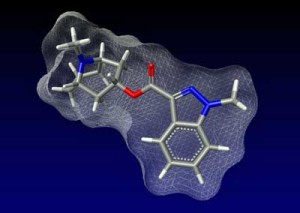Tropisetron Is….
A 5-HT3 receptor antagonist is primarily used to reduce nausea or vomiting during chemotherapy but the drug is finding immune, neurotoxic, pain, skin and other applications.
Pain – Tropisetron reduces receptor activity associated with serotonin’s ability to enhance pain, fear and anxiety. 5-HT3 receptor antagonists both block serotonin’s pain facilitating properties and increase GABA availability.
The findings of this study suggest that tropisetron could be an effective therapeutic agent for the treatment of degenerative disorders of the central nervous system that involves excitotoxicity. Swartz et. al. 2013
Neuroprotection – Tropisetron showed promise as a neuroprotective agent when it reduced glutamate excitoxicity in an in vitro study. Tropisetron reduced ischemic brain injury after a stroke in an animal model.
Immune System – Tropisetron also demonstrated significant immune modulatory abilities when it reduced demyelination and leukocyte infiltration in an animal model of multiple sclerosis. Studies suggest 5-HT3 receptor blockade may also be able to reduce several immune factors that may be important in ME/CFS/FM including TNF-a, IL-1b, IL-6 as well as fatty acid derivatives called prostaglandins.
Cognition and Sensory Gating – Tropisetron improved cognitive functioning and reduced sensory gating issues in schizophrenia.
Autonomic Nervous System Regulator – Tropisetron improved autonomic functioning in fibromyalgia patients (see below).
Tropisetron Might Work in Fibromyalgia and/or Chronic Fatigue Syndrome Because
of its neuroprotective, immune modulating and its ability to reduce pain and sensory gating issues and enhance cognition.
Fibromyaglia and Chronic Fatigue Syndrome Studies
A German research group went to town on Tropisetron and fibromyalgia in the early to mid 2,000’s publishing no less than eight studies but research lapsed after that.
Tropisetron helped to normalize cardiac autonomic nervous system functioning and reduced ‘pain perception’ in a 2007 study. Forty-five percent of patients in a large 2004 trial reported having ‘good’ to ‘very good’ results in a large 2004 retrospective fibromyalgia study. Fifty percent of FM patients in a small trial reported Tropisetron had a good or very good influence on their pain with serum substance P levels dropping in the responders. Reduced activation of brain regions associated with pain production occurred in another small Tropisetron study. Forty percent of participants reported a greater than 35% reduction of pain in a large 2001 Tropisetron fibromyalgia trial. The number of tender points and sleep and dizziness were also significantly improved.
Side Effects
Wikipedia reports Tropisetron is a well-tolerated drug with few side effects. The most common side effects are dizziness, constipation and headache.





